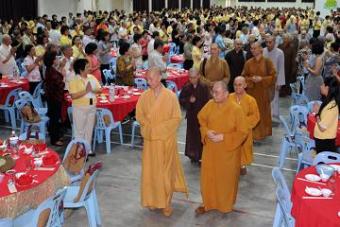Submitted by miyun on

(From The Star North Metro on 23 May 2012)
He came from a well-to-do family and went to Canterbury University, New Zealand, where he graduated with a B.E. (Hon) in Electrical Engineering.
Upon his return to Penang, he worked in a multi-national company and later joined Hewlett Packard and became its quality control manager.
Later, he set up his own TQM (Total Quality Management) consultant firm to serve multi-national corporations including Hewlett Packard, Procter and Gamble, Philips, Fiat and Astec in Asia, Europe and America.
Many of his peers would have expected Neoh Kah Thong to move on to become a successful young entrepreneur, making tons of money and setting up his own family.
But it was not to be. At the age of 43, he decided to be a monk.
“I will now tell you why I chose to become a monk,” Neoh said, adding: “The Buddha taught us to repay the debts of gratitude to our parents, our country and all sentient beings.”
The announcement by Neoh, then the president of Bayan Baru Buddhists Association, to a group of friends and followers caught many by surprise.
That was 20 years ago. Since then, Neoh, who took on the Buddhist name of Ven Wei Wu, has gone on to become the abbot of Than Hsiang Temple in Bayan Lepas, Penang, and has never looked back.
Over the years, Ven Wei Wu has established several Buddhist organisations in Malaysia. They include the Than Hsiang Buddhist Welfare Association Malaysia, Than Hsiang Foundation, Than Hsiang Audio Visual Centre, Metta Free Clinic, Mitra Welfare Centre, Wan Ching Yuen (geriatric centre) and the International Buddhist College in south Thailand.
He has also applied Buddhist teachings with great success in the running and management of these organisations.
Inspired by the Buddhist philosophy of compassion and service, he has become a symbol of ‘Engaged Buddhism’ in South-East Asia — a term first used by Ven Thich Nhat Hanh, meaning Buddhism entering society; this is simply the Bodhisattva ideal.
(Bodhisattva is an enlightened being who, out of compassion, forgoes nirvana in order to save others).
Recollecting his thoughts at a recent dinner in honour of his 20th year of renunciation at the Phor Tay High School hall in Sungai Dua, the affable and amiable Ven Wei Wu said he was all for promoting Buddhism through education.
“When I was a schoolboy, I was already interested in Buddhism and doing welfare work to serve our country. At one time, one of my family’s relatives commented that I should not be a monk!”
A product of Chung Ling High School Penang, Ven Wei Wu recalled meeting with great Buddhist teachers whilst studying in New Zealand.
They included an English Buddhist teacher known as Sangharakshita, the founder of Western Buddhist Order, Tibetan Master, the late Lama Yeshe, who was a teacher of Lama Zopa Rinpoche, and Roshi Sasaki, a Japanese Zen teacher.
From those days, he had listened to teachings and read lots of Buddhist books. He was able to grasp well Buddhist teachings consisting of the major traditions of Theravada, Mahayana including Chinese Buddhism and Vajrayana (Tibetan Buddhism included).
“I have two varsity mates who are Malaysians and they are equally interested in Buddhism. They are Ven Mahinda and Ven Dhammajoti.
“Mahinda later set up a Buddhist Foun-dation in Kuala Lumpur while Dhammajoti is now a professor at the University of Hong Kong,” he noted.
Ven Wei Wu said of the many Buddhist masters he had met, the ones with the strongest affinity with him are Khejok Rinpoche, who now lives in Sydney, Ven Ri Chang from Taiwan and the late Drubwang Rinpoche.
Those great teachers he considers special were Ven Chuk Mor, Ven Siew Ching, Ven Bo Yuan, Ven Hsin Yun (of Fo Guang Shan) and Khejok Rinpoche.
Ven Wei Wu said a person could learn about all the three major Buddhist traditions.
“We should be inclusive and learn more about Buddhism which is an open model. However, ultimately, one must decide which path is suitable.”
He said he chose the Chinese Mahayana path because of his strong affinity with the four teachers in Ven Chuk Mor, Ven Siew Ching, Ven Bo Yuan and Ven Hsin Yun.
“My own practice is the pureland practice. There are many Buddha purelands. In Pure Land School of Chinese Buddhism, the special goal is to go to Amitabha Pureland.
“Than Hsiang followers can choose any path. But my advice is to take up the Pureland practice because it is the simplest and easiest,” he said.
The success of Than Hsiang today hinges on its conviction ‘for the young to learn, the strong and healthy to serve, the sick and aged to be cared for and the departed to find spiritual destination.’


